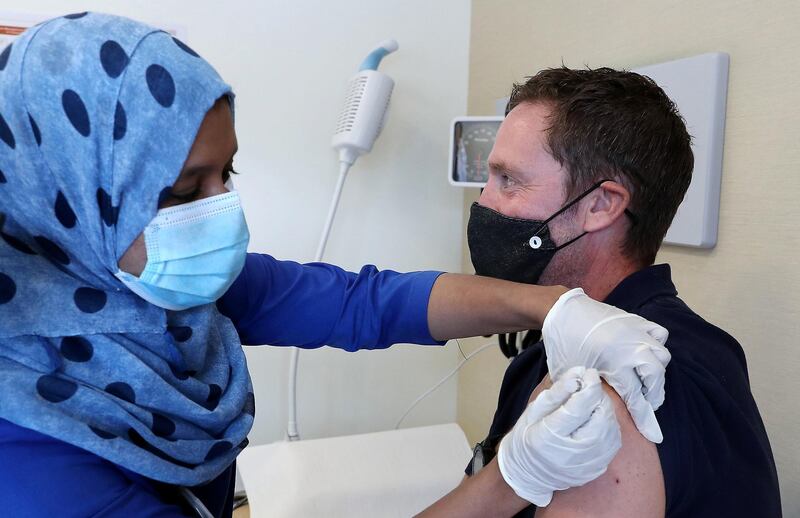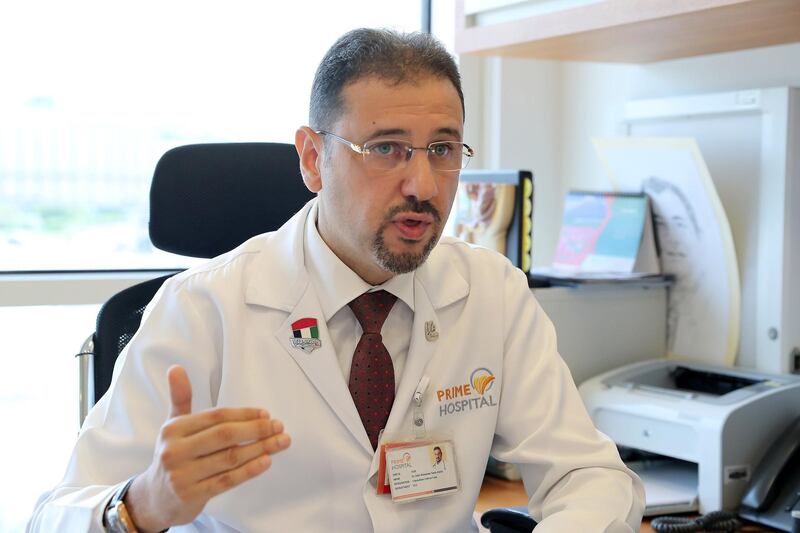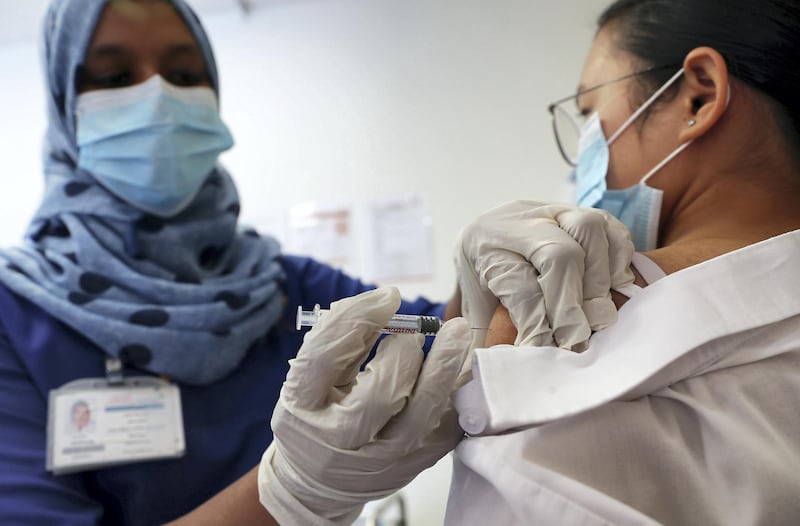Getting the flu shot has never been more crucial, as the world prepares to face the influenza season and the coronavirus pandemic at the same time.
Experts warned that neglecting the annual flu jab could have serious repercussions - and said governments must work to strengthen vaccine confidence among the public.
While positive cases of Covid-19 rise, the full impact of seasonal influenza is unlikely to be felt until February in the northern hemisphere, prompting the medical industry to plan ahead to avoid overwhelming hospitals.
Dr Averyan Vasylyev, a regional medical director at drug maker GlaxoSmithKline, said governments must reassure communities with proven science to reinforce confidence in vaccines.
“If you are a parent or someone caring for a vulnerable person, you should understand the risks of not taking a vaccine and becoming ill,” he said.
“Knowing what a disease is and the damage it can do without a vaccine is often the best way to encourage people to be vaccinated.
“The general misconceptions around vaccines we try to address are often predispositions towards them.
“We try to counteract that to assure people with proven science.”
Rise in global flu cases
Figures from the US Centres for Disease Control and Protection show an increase in flu cases in America over the past two years.
In the 2018-19 season, around 35 million people in the US fell ill with influenza with 16.5 million visiting a healthcare provider for treatment.
There were almost 500,000 people admitted to hospitals and 34,200 deaths related to flu across the US.
Several strains were recorded by epidemiologists, with varying degrees of symptom severity.
Vaccine coverage was estimated to be at 62 per cent for children up to 17, with 45 per cent of adults taking the flu shot in 2018-19.
In the following flu season, ending in April, experts estimate as many as 56 million people contracted the virus in the US, with up to 740,000 requiring hospital treatment.
Deaths from influenza in America in the 2019-20 season ranged from 24,000 to 62,000, according to the CDC.
“We often underestimate the value of a flu vaccine as the various strains of the virus can be quite different,” said Dr Vasylyev.
“Vaccines cannot protect from all strains of flu, so companies will develop a vaccine to fight the most expected strain of the virus each season.
“If we removed the flu vaccination, the impact can be quite severe, with a lot of strain on a healthcare system and more related deaths.
“We have seen that in countries without widespread vaccination programmes in the past.”
Vaccine hesitancy rising in United States and other countries
A recent survey in the US by the Morning Consult Company found vaccine hesitancy was increasing in the country in the wake of the pandemic.
In April, pollsters founds 72 per cent of people would take a Covid-19 vaccine if it were available.
By September, that number had fallen to 51 per cent despite the death toll in the US climbing towards 200,000.
As symptoms for seasonal flu and Covid-19 are similar, doctors face a difficult winter to differentiate between the two.
Vulnerable groups such as children, the elderly, pregnant women and those with chronic illnesses are encouraged to take the vaccine before the end of October.
Peak flu season runs from November to February, and it takes two weeks for antibodies to develop after taking the vaccine.
Doctors are encouraging people to be vaccinated for the flu this year to avoid falling sick and potentially needing to go to hospital, where Covid-19 patients are being treated.
Differences between flu and Covid-19
Symptoms for Covid-19 and influenza are very similar. They both cause respiratory disease and can either show no symptoms or lead to death.
Data collected by the World Health Organisation indicates that an individual showing severe symptoms is more likely to have Covid-19 than influenza.
One of the main differences is that Covid-19 patients often lose sense of smell or taste.
People are also more likely to recover faster from flu than from Covid-19 so anyone with persistent symptoms should get tested for the coronavirus.
Covid-19 taught us good hygiene
Dr Adel Alsisi, a critical care consultant at Prime Hospital Dubai, was one of the front-line heroes treating patients at the height of the pandemic.
“As the population is now aware of hand hygiene, face coverings and social distancing they should be better prepared to protect themselves against influenza,” he said.
“Hundreds of thousands of people across the world require hospital treatment after contracting influenza, and tens of thousands of those people will die.
“Because of this we need to protect the population, particularly as we remain in the middle of a global pandemic with Covid-19.”
Who should get a flu shot and when?
US experts say vaccinations must be done by the end of October at the latest to allow protection during the most vulnerable months, while in the UAE doctors recommend September
Children are most at risk from influenza and are recommended to have two flu shots, four weeks apart, to maximise their protection.
A shot costs between Dh26-Dh56 and only those in a healthy state should take the vaccine as they could suffer light symptoms, such as a mild fever, cough or runny nose.
Out of the 1,000 or so Covid-19 patients Dr Alsisi treated on Prime Hospital’s critical care ward, there were just three deaths.
The hospital is now virus-free as attention turns towards vaccinating against influenza.
“Last year, a lot of patients were willing to take the vaccine, but it could be different this year because of the pandemic,” Dr Alsisi said.
“Some people assume the flu vaccine will protect them against Covid-19 while others may think it leaves them more vulnerable to the virus, so we must educate the community also.
“We cannot neglect the threat of influenza as it can cause serious complications.
“Millions get the flu virus every year and the vaccine is a simple solution.”











